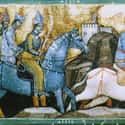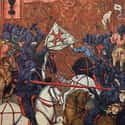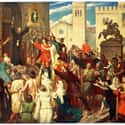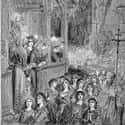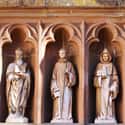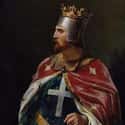-
(#20) The Mongols Got Involved In The Whole Thing
When Jerusalem fell to the Kwarezhmians in 1244, many European Christians looked outside the box for allies in fighting the Muslim menace. Around the same time, in 1242, the Mongol threat to western Europe ended with the passing of Ogedai Khan, the son and successor of Genghis. The lull in conflict in the east led to the proposal of a Franco-Mongol alliance to take Jerusalem back from an empire that was already an enemy of the Mongols. Pope Innocent IV sent an envoy, the monk John of Plano Carpini, to the Mongol capitol of Karakorum, with an incomprehensible letter asking for peace and assistance dealing with Islam. But the new Khan, Guyuk, responded with a demand that the Pope submit to Mongol rule. The alliance never came to fruition, and the Mongols would eventually go to war with Islam, laying waste to Baghdad.
-
(#17) The Sixth Crusade Actually Worked For The Europeans — For A Bit
Seven years after the Fifth Crusade failed, the Sixth Crusade was launched. Unlike most of the others, this one involved very little combat. Instead, Holy Roman Emperor Frederick II negotiated with Al-Kamil to regain control over certain parts of Jerusalem. Christian control was restored to much of what's now Israel. though Muslims stayed in possession of the Temple Mount, the al-Aqsa mosque, and the Dome of the Rock — all areas that are still in Muslim custody. The treaty was cemented in February 1229, and Frederick entered the city a month later.
-
(#27) The Crusades Are Still Talked About — Often Incorrectly
For the better part of a millennium after they ended, the Crusades faded from the collective memories of Western Europe and the Middle East. The Christian world embraced the Renaissance, then the rush of colonialism. European nationalism in the 19th century led historians to rediscover the Crusades as heroic examples of French, British, or German chivalry and martial valor. Even now, both Western and Muslim pundits come back to the Crusades when they need a shorthand for “atrocities.” Western conservatives often see the Crusades as an attempt to liberate the Holy Land from heathens, and liberals point out that mass slaying was carried out on all sides. When President Barack Obama mentioned Christian atrocities carried out during the Crusades, he was accused of belittling Christianity, despite the fact that it’s an indisputable fact that Christian Crusaders did in fact slay numbers of Jews, Muslims, Byzantine Greeks, and others.
-
(#24) The Infamous Children's Crusade Might Not Have Ever Happened
The Children's Crusade is one of the most controversial aspects of studying this period of the Middle Ages. Traditional accounts say that in or around 1212, a French or German boy began preaching that he'd been called on by God to liberate the Holy Land. He gathered a huge band of children, and together they marched toward the Mediterranean Sea, expecting it to part. When it didn't, the children either drowned or were captured and sold into slavery. Modern scholarship disputes almost every aspect of this story. While the Crusade is mentioned in dozens of period sources, the stories are contradictory and embellished. It's not clear whether there was actually an organized crusade, or if it was made up of children. Scholars generally agree separate French and German bands of mostly children, led by charismatic boy preachers, set out for the holy land and met disaster, but the details will never be known.
-
(#14) The Fourth Crusade Split The Catholic Church In Two
In 1202, the Fourth Crusade called. Crusaders from Venice, the Holy Roman Empire, and the Kingdom of France laid siege to Constantinople. In 1204, they brutally sacked the city, going on a vicious spree of slaying, looting, and burning. Pope Innocent III, who had initially called for the Fourth Crusade, rebuked the Crusaders, but still accepted the loot they brought back to Rome.
Only a few knights actually bothered going on to the Holy Land, and the ancient Greek treasures of Constantinople were either destroyed or taken. The conflict between Greek and Roman Catholic Christians was so bloody that it permanently cemented the schism between Eastern Orthodox Christianity and the Vatican. It still hasn't healed.
-
(#15) The Third Crusade Was Launched By Richard The Lionheart
When news reached Europe that Saladin had taken Jerusalem, another call for Crusade went out. King Henry II of England and Phillip II of France began to organize a new army, but Henry perished soon after, and Richard I took his place. Along with the elderly emperor of the Holy Roman Empire, Fredrick Barbarossa, the kings planned the attempt to retake Jerusalem.
Typical of the disorganization of the Crusades, Frederick couldn't wait for the other armies, and launched his crusade on his own. He had some success at first, then drowned crossing a river. Most of his army turned around and went back to Germany before the French and English armies even arrived in the Middle East. A series of battles and massacres ensued, and the Third Crusade ended with Saladin beaten at Jaffa. A truce was reached, with Jerusalem staying under Muslim control.
New Random Displays Display All By Ranking
About This Tool
The Crusades were a series of cruel religious military operations launched under the permission of the Roman Catholic Pope and lasted for nearly 200 years. At that time, Jerusalem, which belonged to the Holy Land of the Roman Catholic Church, fell into the hands of Islam. In order to regain the lost land, the Roman Catholic Church carried out many campaigns.
Rather than saying that the Crusades were a historical event, it is better to think that this is a historical period. This war has affected the development of religions throughout Europe. The random tool shares 27 interesting stories of the Crusades you must be interested in.
Our data comes from Ranker, If you want to participate in the ranking of items displayed on this page, please click here.











